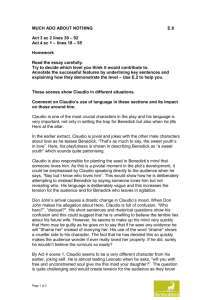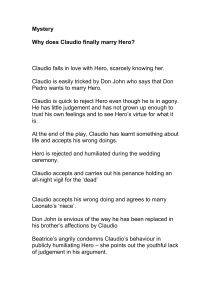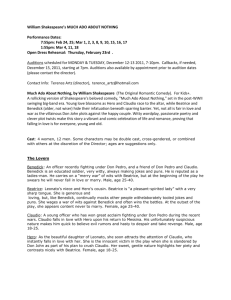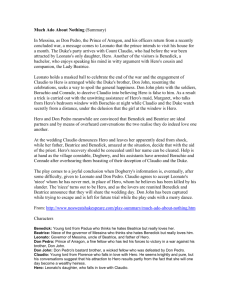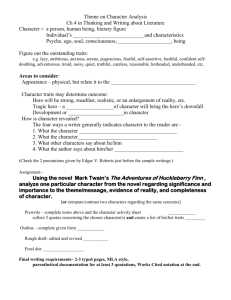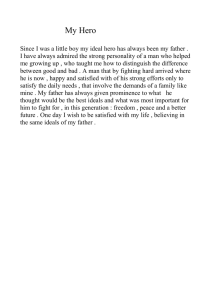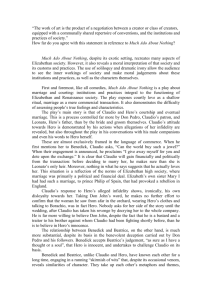Ilyssa Silfen
advertisement
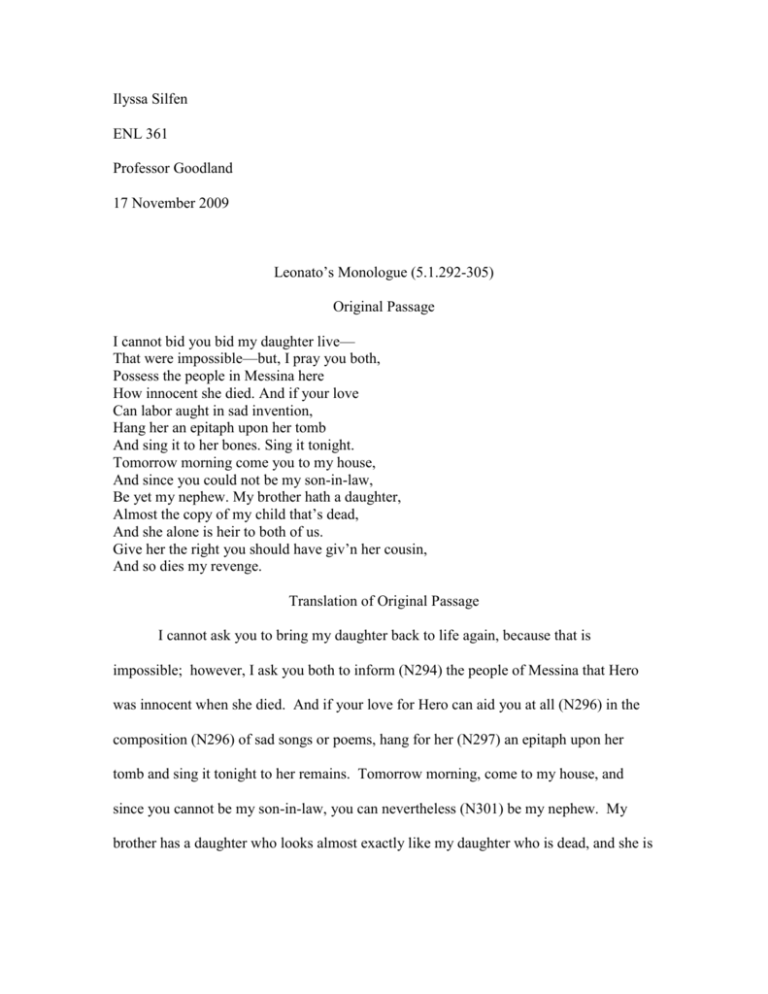
Ilyssa Silfen ENL 361 Professor Goodland 17 November 2009 Leonato’s Monologue (5.1.292-305) Original Passage I cannot bid you bid my daughter live— That were impossible—but, I pray you both, Possess the people in Messina here How innocent she died. And if your love Can labor aught in sad invention, Hang her an epitaph upon her tomb And sing it to her bones. Sing it tonight. Tomorrow morning come you to my house, And since you could not be my son-in-law, Be yet my nephew. My brother hath a daughter, Almost the copy of my child that’s dead, And she alone is heir to both of us. Give her the right you should have giv’n her cousin, And so dies my revenge. Translation of Original Passage I cannot ask you to bring my daughter back to life again, because that is impossible; however, I ask you both to inform (N294) the people of Messina that Hero was innocent when she died. And if your love for Hero can aid you at all (N296) in the composition (N296) of sad songs or poems, hang for her (N297) an epitaph upon her tomb and sing it tonight to her remains. Tomorrow morning, come to my house, and since you cannot be my son-in-law, you can nevertheless (N301) be my nephew. My brother has a daughter who looks almost exactly like my daughter who is dead, and she is Silfen 2 the only heir for both my brother and me. Marry her, like you should have married my child, and my desire for revenge against you will end. Analysis At this point in the play, Claudio and Don Pedro have learned that Hero was not false to Claudio, and they now believe that she is dead by Claudio’s words. When Leonato appears and censures the two of them for the death of his daughter, Claudio offers himself to Leonato to punish him as he sees fit. Instead of having him killed, or killing him himself, as a father might be wont to do, he tells Claudio to hang an epitaph upon Hero’s resting place instead. He continues by telling Claudio to come to his house the next morning and marry his niece, who is nearly an exact look-alike to Hero, and that if he marries his niece like he should have married Hero, his desire for revenge against him will be abated. This part of the play is incredibly important to the work as a whole, in that it sets up the happy ending for Claudio and Hero, and it displays Leonato’s restraint and his devotion to his daughter because of his willingness to allow Claudio to marry his daughter, despite how he treated her on their wedding day. I know that if I were Hero’s father, I’d be beating Claudio within an inch of his life regardless of whether or not she was actually dead before I ever let him go near her again, but Leonato does not do that, and he decides that if Hero really wants to be with Claudio, he will help her in any way necessary. This help comes in the form of him tricking Claudio into thinking that he will be marrying Hero’s cousin, who on the wedding day, after the vows are spoken, is revealed to be Hero. Perhaps Leonato felt that his daughter had suffered enough because of the situation, and he felt that she deserved happiness after having gone through such an Silfen 3 ordeal. I’m sure that Hero was very grateful to her father for allowing her to marry Claudio despite the events that transpired, and I think that she was very relieved that her name was cleared and that she was given a second chance with Claudio. I believe that the audience feels similarly to Hero at this point in the story. We, as the audience, are privy to knowledge that the rest of the characters aren’t; therefore, we know for a fact that Hero has not acted against Claudio and slept with another man, but Claudio and Don Pedro do not, so when Hero is attacked by Claudio on their wedding day and utterly shamed for the alleged adultery, we feel remorse for her. As a result, it’s only natural for us as the audience to feel relief and gratitude, not only for Hero but also towards Leonato; even though he acted out against her at first, he ultimately stood up in her defense, and he was the one that helped put into motion the events that allowed her to marry Claudio, the man she loves, as planned. Critique of No Fear Shakespeare Translation Upon looking at the No Fear Shakespeare translation of my passage, I immediately noticed some similarities between that translation and my own. I took that to be a positive thing, since I like to think that my translations are pretty accurate. However, upon taking a closer look, I began to feel that the NFS translation wasn’t as strong as I had originally thought. One of the stronger parts of the translation was the translation of lines 292-295: “I can’t ask you to make my daughter live—that’s impossible—but I beg you both to tell the people of Messina that she was innocent when she died.” I feel that this is a very strong and accurate translation of the original passage; Leonato, within the original text, is saying pretty much exactly what the NFS translation says he is. However, there were a few parts in the NFS translation that were much less Silfen 4 accurate. The first of these is the translation of lines 295-298: “And if your love can produce something from its sadness, write a poem for her; hang it on her grave and sing it to her bones.” The overall translation is relatively accurate; however, I feel that the word “epitaph” should have been left in the translation, because an epitaph is quite different from a poem. Granted, an epitaph is technically a poem, but it is a specific form of poetry meant to revere and commemorate a deceased person; it is defined in Webster’s Encyclopedic Unabridged Dictionary of the English Language as both “a commemorative inscription on a tomb or mortuary monument” and “a brief poem or other writing in praise of a deceased person (“Epitaph”).” I feel that to translate the word “epitaph” to the word “poem” is misleading and decreases the emotional effectiveness of the statement; if we read that he is writing a poem to her, which could be done for a multitude of reasons having nothing to do with her death, it is not nearly as emotionally evocative as if we read that he is writing an epitaph for her to be put on her grave. The other part that I felt was less accurate was the translation of lines 301-302: “My brother has a daughter who looks exactly like Hero.” The original text states that Leonato’s “niece” is “almost the copy of my child that’s dead (5.1.302),” not that she is the exact copy; therefore, I feel that NFS should have translated that line as saying that “My brother has a daughter who looks almost exactly like Hero.” I also feel that eliminating Leonato’s description of Hero as dead diminishes the emotional heaviness of the situation; when Leonato mentions her “death” over and over again, it adds on to Claudio’s guilt and to the emotional content of the situation as a whole, and so I feel that that should have been left in the NFS translation as well. Silfen 5 Works Cited Mowat, Barbara A. and Paul Werstine. Notes, Much Ado About Nothing. Edited by Barbara A. Mowat and Paul Werstine, New York: Simon & Schuster, 2009. Shakespeare, William. Much Ado About Nothing. Edited by Barbara A. Mowat and Paul Werstine. New York: Simon & Schuster, 2009. “Epitaph.” Webster’s Encyclopedic Unabridged Dictionary of the English Language. New York: Portland House, 1997. 480.
